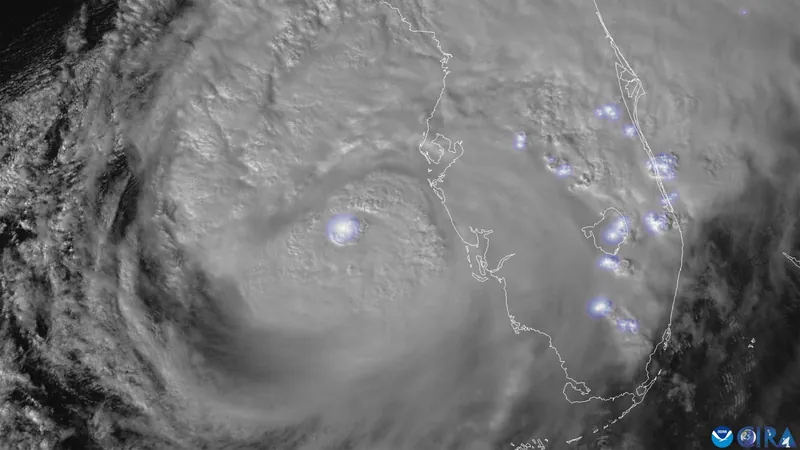
Unprecedented Atlantic Hurricane Season: How Human-Caused Ocean Warming is Fueling Destruction in 2024
2024-11-20
Author: Jessica Wong
Unprecedented Atlantic Hurricane Season: How Human-Caused Ocean Warming is Fueling Destruction in 2024
The hurricane season of 2024 has showcased a worrying trend: human-induced climate change has significantly intensified the power and potential damage of Atlantic hurricanes. Recent scientific studies reveal that the impact of warming oceans, primarily due to human carbon emissions, has dramatically heightened wind speeds, resulting in more destructive storms.
A pivotal research study published in Environmental Research: Climate found that from 2019 to 2023, the maximum sustained winds of Atlantic hurricanes increased by an alarming 19 mph (31 km/h) due to human-caused ocean warming. This increase has had real-world repercussions, with this year's season witnessing all 11 hurricanes impacted by climate change, amplifying wind speeds by a range of 9 to 28 mph (14-45 km/h).
The ramifications of these findings are significant. The research indicated that seven of the hurricanes in 2024 have been upgraded to higher categories on the Saffir-Simpson Hurricane Wind Scale, and storms such as Hurricanes Debby and Oscar have escalated from tropical storms to full-blown hurricanes. Particularly striking was the case of Hurricanes Beryl and Milton, which increased in intensity from Category 4 storms to devastating Category 5 status due to surging winds of 18 mph (29 km/h) and 23 mph (37 km/h) respectively.
Climate expert Daniel Gilford from Climate Central emphasized the gravity of the findings, stating, “Every hurricane in 2024 was stronger than it would have been 100 years ago. Through record-breaking ocean warming, human carbon pollution is worsening hurricane catastrophes in our communities.”
Understanding the Science: A 10% Increase Can Double Damage
What might seem like minor increases in wind speed—such as the 10% attributed to climate change—can have staggering effects. According to NOAA, the damage caused by hurricanes doesn’t just increase linearly; rather, it escalates exponentially with wind speed. For example, a Category 2 hurricane with 100 mph winds can wreak tenfold destruction compared to a Category 1 hurricane with 75 mph winds. Estimates suggest that wind increases alone could result in a doubling of economic damages from hurricanes.
Recent reports have indicated that a significant portion of the damages from Hurricanes Helene and Milton can be directly attributed to the exacerbating effects of climate change, with 44% and 45% of their costs, respectively, rooted in this human-induced phenomenon. Researchers point out that these figures likely underestimate the total economic impact, which can include lasting effects such as decreased productivity and worsened public health.
Experts such as retired NOAA hurricane specialist Jim Kossin have noted the importance of these insights for understanding multiple anthropogenic factors influencing hurricane intensity. However, Kossin cautions that these models may not effectively predict future hurricane behavior due to varying influences on ocean temperatures beyond carbon emissions.
The 2024 season was not without anomalies; for instance, Tropical Storm Sara became an unexpected storyline. Despite forecasts suggesting it would develop into a major hurricane, land interactions prevented it from leveraging the exceptionally warm Caribbean waters and spiraled into a disaster causing over 90 inches of rain and at least seven fatalities.
This hurricane season stands as a critical reminder of the escalating risks posed by climate change. The convergence of warmer oceans and increasing hurricane intensity reveals the urgent need for climate action and the examination of long-term strategies to mitigate damage as our planet continues to face unprecedented environmental challenges.
With evidence now pointing towards the alarming reality of intensified hurricanes, one can’t help but ask: Are we ready to confront the catastrophic results of climate change before it's too late?


 Brasil (PT)
Brasil (PT)
 Canada (EN)
Canada (EN)
 Chile (ES)
Chile (ES)
 Česko (CS)
Česko (CS)
 대한민국 (KO)
대한민국 (KO)
 España (ES)
España (ES)
 France (FR)
France (FR)
 Hong Kong (EN)
Hong Kong (EN)
 Italia (IT)
Italia (IT)
 日本 (JA)
日本 (JA)
 Magyarország (HU)
Magyarország (HU)
 Norge (NO)
Norge (NO)
 Polska (PL)
Polska (PL)
 Schweiz (DE)
Schweiz (DE)
 Singapore (EN)
Singapore (EN)
 Sverige (SV)
Sverige (SV)
 Suomi (FI)
Suomi (FI)
 Türkiye (TR)
Türkiye (TR)
 الإمارات العربية المتحدة (AR)
الإمارات العربية المتحدة (AR)